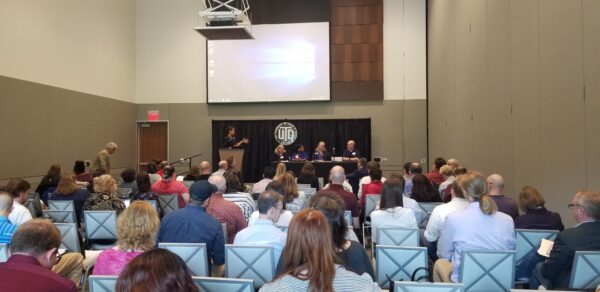In 2021, growing right-wing fears of “divisive concepts” and critical race theory (CRT) took the country by storm. As AHA president Jacqueline Jones wrote in the September issue of Perspectives, the subject has become “the focal point of strident public debates over the teaching of history and civics in K–12 schools and at colleges and universities.” Texas and seven other states have passed a series of anti-CRT bills, many of which have generated responses from the AHA, designed to limit the ability of teachers to educate students about the history of racism and sexism in the United States.

The 2019 Texas Conference at the University of Texas at Dallas was the last to occur in person. But the online format in 2020 and 2021 has broadened the audience. Megan Connor
The AHA’s Texas Conference on Introductory History Courses placed this legislative attack on so-called divisive concepts front and center. From October 19 to November 4, 2021, the seventh annual event provided a space for history instructors at two-year, four-year, and dual-credit institutions to share lesson plans and find approaches to bolster student success in college-level introductory history classes.
Held online for the second year in a row, the conference drew a broad spectrum of attendees eager to understand how these legislative restrictions affect the content and quality of history education. A’Lelia Bundles, a prominent biographer and journalist, participated in the conference because she has long been following the wars over public school textbooks. “I wanted to listen to find out what teachers were going through,” she said. “They are on the front lines and the people who are afraid to speak.”
Following its signature format, the conference featured several plenaries and six small-group discussions. Experienced educators facilitated the smaller discussions in order to develop strategies for the six introductory history courses taught across the state: African American History, Mexican American History, Texas History, US History, Western Civilization, and World History. Attendees discussed the impact divisive concepts legislation was having on their classrooms. One professor in the African American History session shared that after they had designed an African American history course, their institution ignored them when it came time to implement it. Facilitator Theresa Jach (Houston Community Coll.) had a student whose parents prevented her from reading an extra credit book simply because they thought it was about reparations. Still, while anti-CRT legislation alarmed many participants, others were more sanguine. Western Civilization discussion facilitator Kent McGaughy (Houston Community Coll.) noted that many institutions have no structures in place to punish educators for teaching the histories such laws aim to limit.
“We have built each program around helping history instructors understand state policies that shape how and where students take college history courses in Texas.”
Although the intensity of interest provoked by recent legislation is unusual, statewide educational policy discussions are standard at the Texas Conference. “Since the first year, we have organized sessions on pedagogy and resources that are common at teaching conferences,” organizer and AHA special projects coordinator Julia Brookins told Perspectives. “But we have also built each program around helping history instructors understand the state policies that shape how and where students take college history courses in Texas.” Past speakers have, for example, addressed the structure of introductory courses amid the rising cost of higher education and the implications of COVID-19 for higher education policy. The conference has thus formed an important part of History Gateways, the AHA’s initiative funded by the Andrew W. Mellon Foundation to lead a substantial revision of introductory college history courses.
Addressing rather than whitewashing contested history in the classroom was a theme of the conference’s plenaries. Jacqueline Jones’s (Univ. of Texas at Austin) opening lecture was on the ways state and federal governments have supported systems of racial prejudice in the United States since the 18th century. She concluded that the civil rights legislation of the mid-20th century was not sufficient to guarantee a level playing field for all. Attendees were eager to reflect on recent attempts to discourage the telling of expansive histories, including the Trump administration’s 1776 Commission report that resulted in the creation of the “patriotic” Hillsdale 1776 Curriculum already implemented in public schools across the country. During the Q&A after Jones’s talk, Brookins reiterated the importance of holding this conference in Texas (albeit virtually), where educators in the states most under threat can come to collaborate.
Other talks focused on specific pedagogical practices. Leonard N. Moore’s (Univ. of Texas at Austin) keynote targeted one issue at the core of anti-CRT legislation: “Teaching Black History to White People.” In this talk, based on his recent book, Moore provided several strategies he has found useful in teaching controversial subjects to recalcitrant audiences, methods educators could apply to discussing CRT and Black history with white students, parents, and legislators.
One method used the Monopoly board game to explain the history of state-sponsored segregation. Moore asked listeners to imagine a game in which he started with less money than his white counterparts and was prevented from buying property until his 20th turn—yet still he had to pay rent and taxes and could go to jail. It was clearly impossible for Moore to win, regardless of his skill level. And when the players’ children took over the game, continuing with the property (or lack thereof) that their parents left behind, they experienced the economic disparity without experiencing its origins. As a consequence, they could not see how their success was predicated on historical inequalities.
In addition to encouraging diverse course content, part of the conference addressed designing the structures of courses with consideration of students’ and teachers’ unique backgrounds. The panel, “A Return to Humanity in Teaching,” featuring Stephanie M. Foote (John N. Gardner Institute for Excellence in Undergraduate Education), Daniel J. McInerney (Utah State Univ.), Tomiko M. Meeks (Texas Southern Univ.), and Amy Powers (Waubonsee Community Coll.), discussed classroom practices that create inclusive and responsive learning environments by taking into account the identities of teachers and their students. Foote provided a worksheet instructors can use to reflect on whether aspects of their course design privilege some student identities—or their own identity—over others, and she suggested steps to ensure a greater number of students succeed. Panelists stressed the importance of practicing reflective teaching, assigning projects on family history, and building connections among all members of the class, all things divisive concepts legislation appears to discourage.
Classroom practices can create inclusive and responsive learning environments by taking into account the identities of teachers and their students.
This approach resonated with attendees. Small-group participants shared that they found greater student engagement when students felt like the professor cared about them. Priscilla Martinez (Univ. of California, Santa Cruz) encouraged Mexican American History course discussion attendees “to place students at the center of their teaching.” She found that students benefited when she and her co-instructor had them put together lesson plans for students in their respective communities. “Students became so invested when they were put in the role of a teacher,” she said. Other instructors found similar success when assigning local history papers or having students record their own oral histories. Their experiences suggest that restricting the telling of diverse histories does a disservice to student engagement across the board.
The importance of taking a holistic, student-centered approach came up during the course discussion on Texas History. Gene B. Preuss (Univ. of Houston–Downtown) noted that considering students’ identities in the classroom can often be counterintuitive. “We as academics tend to put students into categories,” he commented, “but many students don’t see themselves siloed like that. They see themselves as multicultural.” Walter Buenger (Univ. of Texas at Austin and Texas State Historical Association) shared Adolph Hofner’s “Shiner Song (Farewell to Prague),” a piece with German, Czech, and Tejano influences, illustrating that Texas history is about an abundance of cultures merging. In the history classroom, it is crucial to talk about all of them.
Attendees appreciated that the conference brought together people at different institution types and instructional levels. Martinez was a little surprised that she was the only graduate student in the Mexican American History course discussion, but “despite the gap in career stages, I felt welcomed,” she told Perspectives. “I was also comforted to learn that [others] were grappling with the same pedagogical questions I was struggling with.” For Preuss, the mixing of high school and postsecondary educators is invaluable—“We can learn from each other.” Sessions boasted a mix of instructors from four-year, two-year, and K–12 institutions from the United States, and conference registrants came from as far as Canada. Clearly, there is an appetite for effective introductory history course design, especially amid efforts to restrict this history, beyond the borders of the United States.
Bundles, who attended high school in Indianapolis in the 1960s, urged conference goers to think about the legislators of her generation (and older) enacting anti-CRT measures. “My generation learned a version of American history that is inaccurate and inadequate,” she said, pointing to the fact that what students learn in the classroom shapes policy down the line. Such legislators believe that the teaching of histories unfamiliar to them is historical revisionism by radicals, rather than what it is—a reorientation toward the best practices of the discipline.
Texas historians and teachers should look forward to another Texas Conference in the fall of 2022. According to Brookins, attendees find that “the experience has strengthened historians’ networks across the state, and may prove helpful in responding to the recent wave of legislation aimed at restricting history education in Texas and other states with a conservative electorate.”
For those who missed this year’s events, recordings of two of the plenaries are available on the AHA’s YouTube channel, and discussions about anti-CRT legislation will continue at the 2022 annual meeting.
This work is licensed under a Creative Commons Attribution-NonCommercial-NoDerivatives 4.0 International License. Attribution must provide author name, article title, Perspectives on History, date of publication, and a link to this page. This license applies only to the article, not to text or images used here by permission.
Related Articles
Sorry, we couldn't find any articles.
